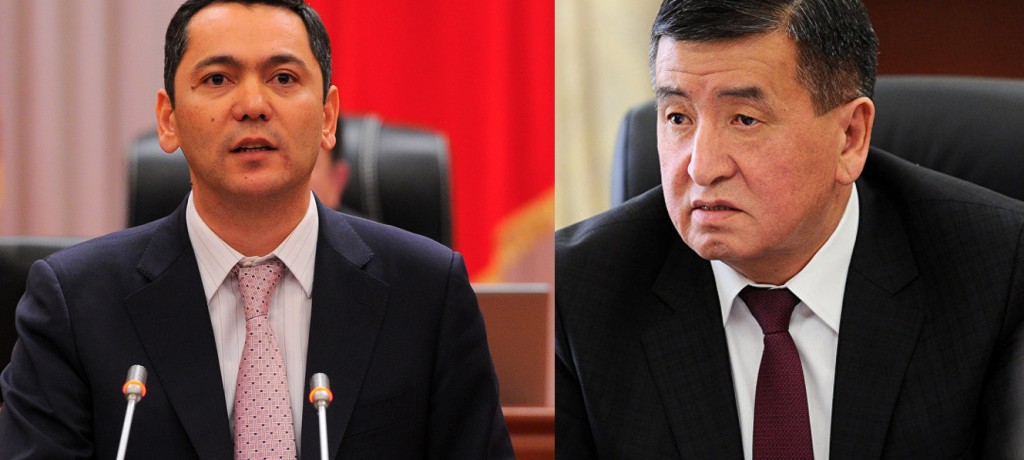ASTANA – Perhaps one of the most anticipated and unpredictable intrigues of the year in Central Asia is the Oct. 15 election in the Kyrgyz Republic, a country of slightly more than six million people.
Fifty-nine candidates have been registered – 11 from political parties and 48 self-nominated, according to the Kyrgyz central election commission. The questions region watchers tend to ask are who will become the next leader, what can change in Central Asia once the new Kyrgyz president is elected and what this will mean for the outside world?
Current President Almazbek Atambayev, who is not allowed to run for another term under the 2010 constitution, repeatedly stated he will stay in power in one way or another after his tenure, prompting speculation of him having reached some understanding with the leading candidates.
While there is no clear leader in the race for president, former Prime Minister Omurbek Babanov, with his financial resources, and current Prime Minister Sooronbai Jeenbekov, with his administrative resources, are thought to be ahead of the rest.
Babanov is very well-known amongst the so-called northern ranks of politicians and elites. His political ambitions, pragmatism and thirst for profit have earned him the reputation of a tough businessperson few would want to cross paths with.
Jeenbekov has been enjoying friendly relations with Atambayev for years. His July 15 statement “I am ready to be the President,” spoken when he was unanimously named as the candidate by his Social-Democratic Party of the Kyrgyz Republic (SDPK), sounded like a confident assertion.
The expert community, however, believes Jeenbekov, who hails from the southern part of Kyrgyzstan, will face resistance from northern elites. Both after the 2005 and 2010 coups, the relations between southern and northern politicians are still sour.
There is no clear indication yet of who will be the frontrunner.
Time to turn the page, Central Asia?
Director of Eurasian Council for Foreign Affairs (ECFA) Zhanbolat Ussenov believes whoever comes to power in Bishkek will better the relations within Central Asia.
“I would expect that the upcoming election will have a positive effect on the overall political climate in the region,” he told The Astana Times in an exclusive interview.
“It is particularly so with regard to Kyrgyz-Uzbek relations. Since last December, [Uzbek President] Shavkat Mirziyoyev brought new hope for Uzbekistan’s somewhat strained relations with some of its neighbours. Soon, his counterparts in Bishkek will have a new presidential team with a fresh mandate from the Kyrgyz public, not a lame duck administration which is rarely able to deliver something bold and ambitious in any political circumstances and in any country. So, new major openings along Kyrgyz-Uzbek lines could be expected and those developments should have a positive effect on regional affairs,” he said.
Speaking of Kazakh-Kyrgyz relations, Ussenov believes they will “naturally grow with time.”
“And it is not only for cultural or geographical reasons. Kazakhstan – a net raw material exporter – is more compatible, trade-wise, with the Kyrgyz processing-based economy than it is with other Central Asian countries whose extractive industries are more of a competition to Kazakh exports. Therefore, I believe that the change of top political personnel in the Kyrgyz Republic may shift the pace of growing cooperation upwards or downwards, but cannot overturn the overall strategic drive to enhance exchange and cooperation between the two countries,” he added.
The great game is back on… not?
Political scientist Ariel Cohen, a non-resident senior fellow at the Washington-based Atlantic Council and director at the Centre for Energy, Natural Resources and Geopolitics at the Institute for the Analysis of Global Security, in one of his recent articles, “America’s next security competition will be in Central Asia,” urges the Trump administration to not remain a bystander to the various trends taking place here.
“Today, Central Eurasia is undergoing another broad transformation, one that may lead to regional cooperation and growth,” he said. “Unfortunately, the U.S., distracted by Washington scandals, Russia investigations, the healthcare debacle and a myriad of foreign policy crises, may miss the boat – but it had better not.”
“With the China-Russia collaboration, the Shanghai Cooperation Organisation expansion and the Beijing-led One Belt, One Road reformatting Eurasia as we know it, the U.S. cannot afford to just sit and look on from the bleachers. It needs to get onto the field and play,” he added.

